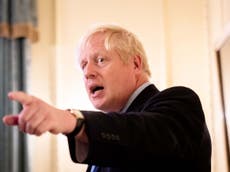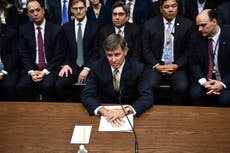I won’t bite my tongue over racism at the BBC any longer – the treatment of Naga Munchetty is disgraceful
I’m not out to get the Beeb, far from it. I love it. But the presenter’s treatment is indicative of a culture that desperately needs addressing

Yes, here I am, another brown person unable to keep my beak out of Naga-gate. The BBC has decided that Naga Munchetty “breached” its guidelines for pointing out that Donald Trump was being racist when he said things which were racist.
If Donald Trump had, say, kicked a kitten, then the British Broadcasting Corporation would I imagine, be fine with their presenter stating that he had, indeed kicked a kitten. There would be no grey area, no meetings or consultations, no pouring over policy to define “kick”. Furthermore, I imagine the BBC would be completely comfortable with their presenters condemning Trump for kicking the kitten as we are all agreed that, like racism, kicking kittens is, on no planet, acceptable or justified. It is simply wrong. Similarly, racism is not a matter of opinion. As anyone who has experienced it will tell you, as indeed Munchetty did, when asked by her co-host, racism is very obvious to the person on its receiving end. It is, (all puns intended) a black and white issue.
Munchetty shared that when people had told her to go back to where she came from, the comments were “embedded in racism”. Hardly an eye-opening observation. First time I was told to “go home” was when I was four or five years old by a bunch of people slowing down their car to scream it at my young mum and me. Back then I didn’t realise this was racism, I thought they just didn’t know we lived up the hill and home was exactly where we were going. Kids eh? I soon learned.
The BBC received one complaint. One. Let me repeat that: one. Happily this indicated that the rest of our population understood that Munchetty was stating a fact and that the vast majority of the British public understand that racism is not subjective. The BBC need to keep up. What they did by partially upholding this complaint, was to tell their presenter, a woman of colour, to essentially, get back in her box. As a person of colour myself (natural calico if you’re wondering) who always had dreams of working for the BBC, their decision was hurtful and a reminder of how absolutely impossible it has been to express bias I have felt in the BBC and how tough it has been to flag it up to anyone for fear of damaging your career by being seen as “whinging” or being an upstart. There. Now I’ve said it.
I understand the BBC is under great scrutiny and there are swathes of people wanting to bring it down. I am not one of those people. Are you kidding? I am constantly hustling to be a part of it (seriously News Quiz, one booking? A decade ago?!) I’m long enough in the tooth these days to have the confidence to insist the BBC listen to those of us who love it and try to understand areas where non-white contributors feel muted or typecast. We see white counterparts progressing and becoming part of its very fabric, whereas non-white artists and contributors (bar a few exceptions) are on more of a conveyor belt. Lenny Henry has campaigned to flag this up but we can’t just leave it to him.
When I was a brand new, promising young comedian in my early twenties, I was in the BBC New Act of The Year finals. I had an exciting meeting where I was asked to submit an idea for a radio show. I wrote a synopsis of a sitcom about my life as a nude, artist’s model. It was how I paid the rent at the time and you write about what you know.
The BBC were keen to “nurture new talent” and constructive feedback was promised. When it finally came, it said one thing, just one line “We were hoping for a script based on your experiences as an Iranian”. From the very start, they directed me to my box and told me to go and sit in it.
This was back in the Nineties and I was very young and terrified of being seen as “difficult”. It’s been a long creative and personal battle to get myself off that hook. That one email made it clear that they had diversity targets to meet so if I could be so kind as to remain as brown as I could possibly be, then I was more than welcome to join in for a while.
This kind of prejudice is well meaning and damn it that makes it even harder to address. You have no idea how often I’ve bitten my tongue. One never wants good people to feel accused of racism, but the debate shouldn’t be an awkward one. We spoke about sexism and things eventually are changing. Like sexism, racial bias can happen unconsciously. So don’t feel bad, just listen.
I’m not out to get the BBC, far from it. I love it. I grew up watching and listening to it. I’m beside myself with happiness when I’m on it. But in the case of a presenter calling racism exactly what it is, and being reprimanded – this is an obvious example of the corporation stifling people of colour.
Gaslighting wasn’t in my Nineties vernacular. It is now. I had a visceral response to the upholding of this one complaint against Munchetty as a result of years of being gaslit about racism. I was told I was imagining it, that I have a chip on my shoulder or that I shouldn’t complain as my colour has “helped” me in my career. Enough. The BBC must apologise to Munchetty so we can all move forward.




Join our commenting forum
Join thought-provoking conversations, follow other Independent readers and see their replies